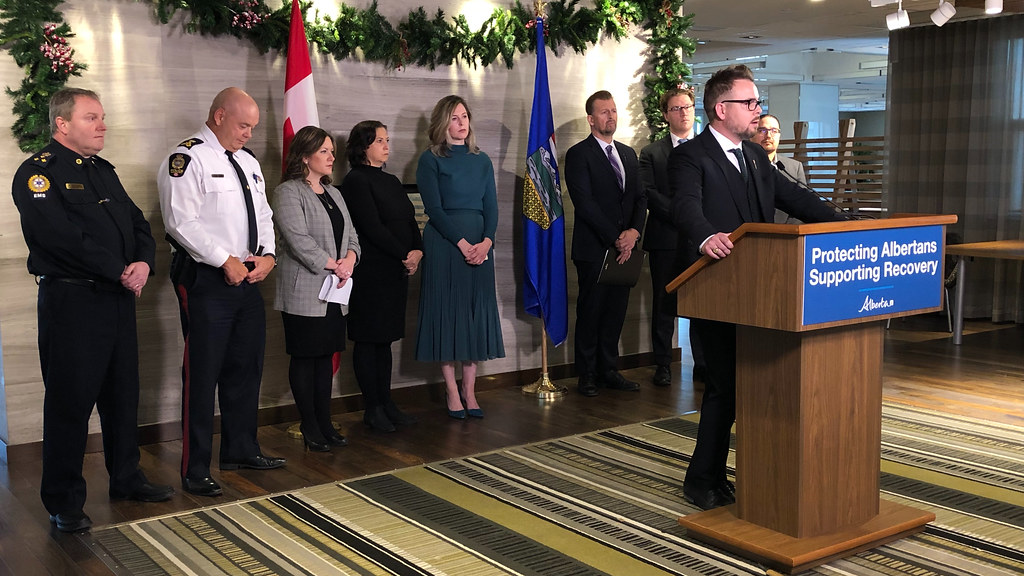When the province announced the new Edmonton Public Safety and Community Response Task Force on Dec. 13, some criticized the creation of yet another committee to address the city's ongoing crisis of addictions and homelessness.
"Edmontonians don't need yet another task force, they need urgent action to save lives," said Chris Gallaway, executive director of Friends of Medicare.
But one member of the task force, Susan McGee, said she's optimistic it will have an impact. "I'm seeing the opportunity to have our current strategies elevated and supported," the CEO of Homeward Trust told Taproot.
Acknowledging that the formation of another task force can leave people feeling "exasperated," McGee said she can't imagine passing up the opportunity to provide input and share the challenges she sees.
"Throughout my entire career there has always been and will continue to be reconvening," she said. "You could line a block with the reports I've seen over the 30 years of my career."
But that's not necessarily a bad thing, she said. Rather, it's simply part of the work. "Part of planning and informing and ensuring we try to do our best is inevitably going to include revisiting stuff," she said. "That happens with every change in government and at every order of government."
The makeup of the task force has also been criticized, especially for a lack of members with lived experience.
Hearing from folks with lived experience is important, McGee said, noting that Homeward Trust has a lived experience committee that is providing input into the local plan to end homelessness, which will soon be updated. As for the lack of those voices on the new task force, McGee isn't concerned.
"The composition is very intentional around those ministries having a highly coordinated approach," she said.
McGee said there's increasing acknowledgment of the barriers people face, and a lot of the failures that result in homelessness are in complicated systems. "Any time there's a meaningful opportunity to elevate that again I think it's important to do," she said.

Provincial cabinet ministers Nicholas Milliken, Mike Ellis, Jeremy Nixon, and Rebecca Schulz stood with other members of the new task force at a news conference on Dec. 13. Homeward Trust's Susan McGee is fourth from the left. (Government of Alberta/Flickr)
McGee views the involvement of four ministries as an encouraging level of engagement from a provincial government that is regularly criticized by leaders in Edmonton for failing to do its part to address the city's homelessness crisis.
In September, CBC News reported that several new supportive housing complexes were ready for occupancy if only the province would provide the required operational funding.
"The need is very high," McGee said at the time. "The lack of sufficient resources to address it, certainly there's a frustrating element to that."
The situation has changed somewhat since then. On Oct. 1, the province announced $63 million in new funding to reduce homelessness over the next two years. About $12 million of that was used to increase Homeward Trust's base funding, boosting it to $40 million.
"That enables us to include it in our future modelling," McGee told Taproot. "Some of that goes directly into the sustainability of the sites we manage, and some of it goes into rent subsidies for the individuals using the sites."
McGee said that without that additional funding, it was difficult to ensure the sites would be successful, especially given that some have enhanced and specialized individual supports.
"Supportive housing as a model and how we develop those projects and support them has been kind of emerging, in terms of the level of support, and the fact that they're not all the same," she said. McGee would like to see a move away from project-by-project funding for supportive housing, and she's hopeful the task force can help to elevate that conversation.
McGee said she sees a lot of work that is already underway converging in the next few months. She said communities across the province have been trying to figure out how to make the best of the recovery-oriented system of care that comes with provincial funding.
"How do we make sure that the folks that are most vulnerable are connected to all the services they need," she said, suggesting there's a short-term opportunity to get things implemented.
"I never want to miss an opportunity to advocate for increased supports," she said.
